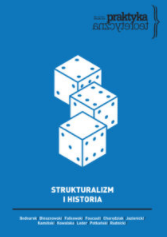Pochwała donkiszoterii, czyli o tym, co strukturalizm wniósł i co wciąż może wnieść do historii
An apology for quixotism, or how history has been influenced by structuralist and post-structuralist thinking
Author(s): Tomasz FalkowskiSubject(s): History, Structuralism and Post-Structuralism, Methodology and research technology, Philosophy of History
Published by: Uniwersytet im. Adama Mickiewicza w Poznaniu
Keywords: structuralism and history; validity of structuralism; origins of geometry; Michel Serres;
Summary/Abstract: The paper discusses various possibilities of using structuralism in the current historical research. It seems, e.g., that this methodology or mode of reasoning could still be helpful to understand the origins of some historic phenomena. Despite the widely-held belief, the most important thinkers associated with structuralism, such as Jean-Pierre Vernant, Roland Barthes, or Pierre Vidal-Naquet, did not reduce their interests to the study of synchronic relations, but – as Foucault put it – attempted to fashion the instrument for a precise historical analysis. It was also a case of Michel Serres’ reflection on the origins of geometry. This example is closely examined in the paper to indicate some differences between both traditional and structuralist approaches to that question.
Journal: Praktyka teoretyczna
- Issue Year: 2016
- Issue No: 22
- Page Range: 88-104
- Page Count: 17
- Language: Polish

